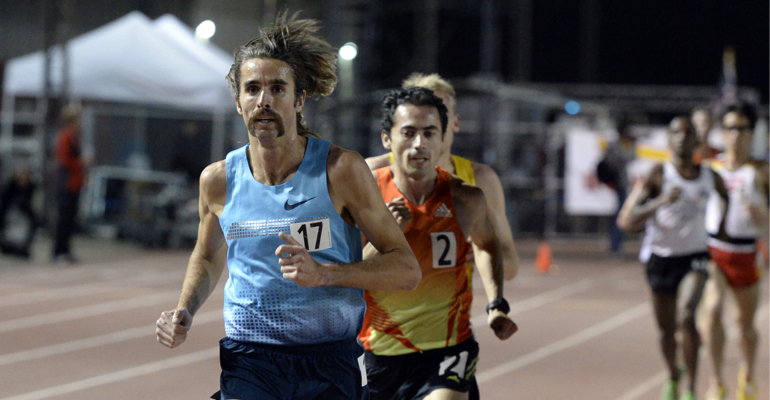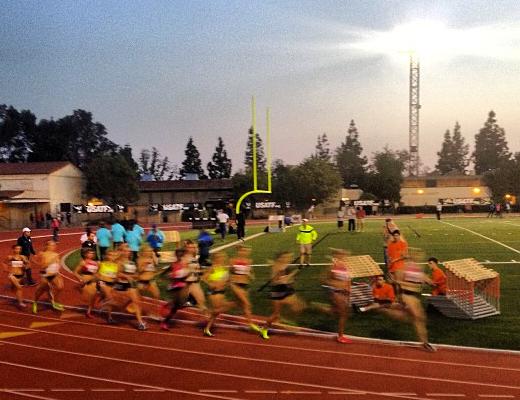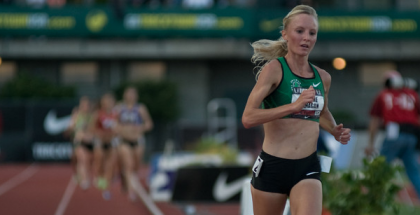Will Leer's journey to Moscow runs through Southern California
Kevin Sully | On 25, Apr 2013
Photo courtesy of TrackandFieldPhoto.com
Most twenty-somethings who relocate to Los Angeles do it to chase a dream. They don’t envision moving into their parents’ home or being in bed before 10:00 p.m. Then again, most twenty somethings aren’t elite athletes trying to revitalize their career.
For Will Leer, the decision was simple. After spending four years at Pomona College thirty miles east of Los Angeles, he romanticized returning to Southern California for days filled with surfing, coffee on the beach, training in beautiful weather, and relaxing with college friends.
Since turning professional in 2007, the 28 year old from Minnesota has always been surrounded by runners. First, with the Oregon Track Club in Eugene and then in Ann Arbor where he ran alongside Olympic silver medalist Nick Willis among others.
He has also always been on the cusp. Fourth in the 1500m at the 2008 Olympic Trials. Three times a national championship finalist outdoors. In the 1500m, where consistency is a rarity from race to race, let alone season to season, he has managed to become a mainstay. But in a sport that is measured in Olympic and outdoor World Championship teams made, he has yet to truly break through.
After wrapping up another solid season last year where he again qualified for the finals of the Olympic Trials but finished 12th, he found his training group in Ann Arbor in flux. Some were leaving Michigan; others had obligations that put their time at a premium. With his training partners in a transition period, he decided that it was the time to prioritize the pleasant temperatures and the less rigid schedule that California would bring.
In October, he brought a few suitcases, some short shorts, a swimsuit and joined his parents, or what he calls his “65-year-old roommates,” in their three-story condominium in Marina Del Rey, seven miles from the LAX airport and just over 200 yards from the ocean.
Moving to Los Angeles wasn’t without risks. While the city is a haven for the talented–and for those aspiring to be– it has little presence in the distance running world. Will would have to train on his own. His coach from Ann Arbor, Ron Warhurst, agreed to continue to advising him, but it would be through emails, phone calls and conversations over Skype.
Rather than ramp up the pressure and mental intensity, he went the other direction. Moving to Los Angeles disconnected him from what he calls the 24/7 running lifestyle that is common in elite athletes.
The “less is more” approach appears to be working.
At the United States Indoor Championships in Albuquerque in March he won the 3,000 and the mile on consecutive days. He ran the mile in a particularly quick 3:58.79. Later, he ran a 5,000 on the road in Carlsbad and finished as the first American in 13:36. On April 19th his auspicious start to the season continued when he won the 5,000 at the Mt. SAC Relays in a personal best of 13:21. “There is a huge part of running that is mental, if you aren’t happy, if you start out miserable it is only going to get worse, I’m happy living in California, I’m in a place that I thoroughly enjoy.”
Without training partners or a coach waiting, he dictates his own schedule. In the downtime he immerses himself in the beach lifestyle. Sometimes he hops on his red beach cruiser and pedals to the Venice Pier. Other days, he ambles down to the sand to read a David Foster Wallace novel in the brilliant sunshine.
When he can, he borrows his parents’ car to run on the forgiving grass of San Vicente Boulevard or the track at Santa Monica College. On other occasions, he heads north out the front door through the Venice boardwalk. Far from the bark chips of Eugene or Ann Arbor’s single track trails, the boardwalk is a hub of eccentricity, even on its calmest day.
The mosaic of skateboards, medical marijuana shops, and weightlifters, or what Will describes as, “literally every walk of life, except elite athlete” cram into a few miles of sand, asphalt and palm trees. His shoulder length brown hair and signature mustache that reaches past his jaw are quirky enough to fit in with the rest of the crowd. His speed, however, makes him stand out.
Aside from the street vendors and permanent beach residents he is typically, without a companion on these runs. Still, he enjoys the bizarre admiration from cyclists and passersby even when they critique his attire. “This guys spots me,” he recounts, “had to be 400 meters out and starts going at me: ‘That shirt shouldn’t say Nike that shirt should say ‘You.’ You gotta represent you. These corporations are taking over the world.'”
Occasionally, he gets to run with others. The longer he lives in the area the more some of his fellow elite athletes contact him for a run when they are in town. Last month, he made his yearly trip to Flagstaff, Arizona to train at altitude. He enjoyed the camp and the opportunity to run on a daily basis with his peers. However, he spends most of his time in Los Angeles, either out on a run, or at home with his parents.
At home, running is rarely a topic of conversation. After the past year, the family has had much more pressing issues.
Will’s parents, Chuck and Mary Leer, purchased their condo in Marina Del Rey in 2011 to use as a respite from the cold months in their native Minnesota where they work as real estate developers.
When the Leers bought the place, they didn’t know that they would be a 15-minute drive from the office of Dr. Sant Chawla. The proximity to Dr. Chawla, one of the nation’s most respected authorities on sarcoma oncology, is one of the odd bits of fortune that the family encountered in a year of difficult news.
It was May of 2012 when doctors realized the cyst on Chuck’s hip was cancerous. The mass was diagnosed as an angiosarcoma, a rare form of cancer that is even less common amongst adults. After two surgeries eliminated the tumor he returned to the doctor to do a scan. The scan showed a spot on his lung. Another surgery resected the nodule, but by then doctors realized it had metastasized in his blood. Soon after receiving that news Chuck and Mary decided to treat the cancer aggressively in Los Angeles with Dr. Chawla. Will would join his family in October; his decision to move was reaffirmed.
Ironically, Chuck credits the disease with saving his life. During one his scans over the summer in Minnesota doctors discovered severe blockages in both arteries that required a quadruple bypass. Doctors described him as a “walking time bomb,” the kind that drops dead of a heart attack without showing any symptoms. Without cancer, he never would have been alerted to his urgent condition.
On a gloomy Sunday in April, Chuck looks more like the man who played rugby for 16 years than someone who has just been through 22 weeks of chemotherapy. He is a fit 63, the result of a life filled with running, kayaking, weight lifting and a variety of team sports.
Chuck is currently classified as N.E.D (no evidence of disease). This doesn’t mean the cancer is gone completely and he is working with Dr. Chawla on a maintenance program that includes regular scans. Soon after Chuck was diagnosed, both he and Will stopped researching cancer on the internet; too much hypothesizing, too many possibilities, and often times too grim.
The illness has given Will perspective on his running.
“What we do as athletes is easy, compared to fighting a life threatening disease. Poisoning your body for 18 weeks is no small feat. My training is the only thing that I have to tangentially refer to what he’s going through. When he is getting on a new drug or feeling a certain way I relate it to how I feel like during a big training block. So I try to contextualize.”
The new living arrangement has been an adjustment for his parents as well. For the first time, Chuck is seeing the professional athlete lifestyle firsthand. “Either he is getting ready to run, he is running, or he’s recovering from a run.”
Increased mileage is another change for Will. He is averaging 90-100 miles per week, up from 75-85 in prior years. On the days when he doesn’t run twice, he bikes the 1200 meters to the gym for a strength session.
The training is taking a toll. Even though he is more than thirty years younger than his parents, Will is usually the first to bed. “I don’t think until he started living with us this season that I fully appreciated how hard he works at what he does. When you hear about it from a distance you say, ‘Oh you worked out today, you ran, you did this, you did that but you have no idea what’s in between what they do and how exhausted they get from doing it,” Chuck said.
It is the time in between all these workouts where Will is able play other roles. He helps his father with his diet, something a professional endurance athlete is particularly qualified to do. During the day they go for foot massages and occasionally Will joins his dad for one of his twice a day beach walks at low tide. In the evening, they watch the Lakers on television and have dinner as a family.
Sometimes his responsibilities are more serious. Recently, while Mary was back in Minnesota on business, Chuck’s temperature skyrocketed after a reaction to a new medication during chemotherapy. Will sensed something was wrong and drove him to the hospital where he spent the next nine hours.
Will’s long term future in running is uncertain. He is under contract with Nike through 2014 with an option to extend through 2016. If the last few months are any indication, he may end up running longer.
Chuck sees the change as well. “He’s there now, you can hear it in his voice, you can see it in the way he carries himself that he believes in himself, that he believes he is gonna do it.”
After Will’s win in the mile in Albuquerque, the television camera cut to his elated parents in the crowd. Rarely one to miss a meet under any circumstance, Chuck will be attendance at the USATF championships in Des Moines where his son will try to make his first World Championship team. He hopes for a trip to Moscow for that meet in August.
Will’s primary goal for the season is Moscow. His secondary goal is also Moscow. In his mind, the journey to get there parallels the struggle of his father’s recovery.
“Now he is coming out of it, now he is getting ready to peak for USAs. He is cutting the mileage; starting to feel good again, feel like his old self.”
Chuck also recognizes the similarities. “I suppose that could be part of it for Will too, when you are young you think you have forever, to do whatever you want to do, there is no urgency. Maybe he is sensing a greater urgency, he hears the clock ticking and that’s something that has made him step up this year.”
-
Wow. Awesome Article.
-
Wonderful story, thank you.



















Comments